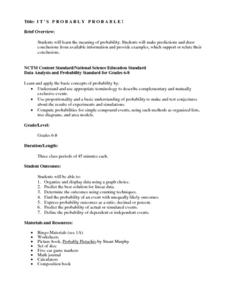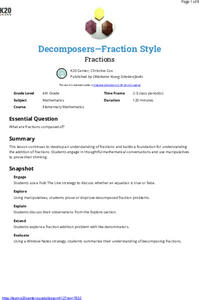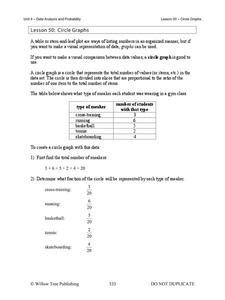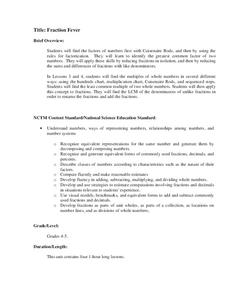National Math + Science Initative
Introduction to Decimals
Three activities make up an introductory lesson designed to create a strong foundation in comparing fractions to decimals and exploring and building decimal models. Pupils brainstorm and complete a Venn diagram to show how decimals and...
National Security Agency
It's Probably Probable
Learners make predictions and draw conclusions from given information as they learn the meaning of probability in this vocabulary-rich, integrated activity that presents a variety of teaching strategies to motivate and reach...
K20 LEARN
Decomposers—Fraction Style: Fractions
"What are fractions composed of?" is the essential question of a lesson designed to enhance understanding and strengthen the foundation of adding fractions. Mathematicians start by discussing what makes an equation true or false,...
Willow Tree
Circle Graphs
Pie isn't just for eating! Scholars learn to create pie charts and circle graphs to represent data. Given raw data, learners determine the percent of the whole for each category and then figure out the degree of the circle that percent...
Missouri Department of Elementary
Are You Balanced?
Balance scales create a strong visual of how an individual prioritizes one's self alongside their commitments to the community, school, and home. Scholars complete a graphic organizer then discuss their findings with their peers. A...
Project Maths
Introduction to Trigonometry
The topic of trigonometric ratios is often covered with loads of rote memorization baked into the activity. This activity set, however, leans more on using similar triangles and discovery learning to help young geometers develop a deeper...
National Security Agency
Fraction Fever
This unit on fractions allows for upper-aged elementary learners to explore ways to find the greatest common factor and least common multiple of two numbers. Ultimately, young mathematicians will be able to identify equivalent fractions,...
Curated OER
Using Random Sampling to Draw Inferences
Emerging statisticians develop the ability to make inferences from sample data while also working on proportional relationships in general. Here, young learners examine samples for bias, and then use random samples to make...
K20 LEARN
Comparing Numbers And Fruit—More Or Less: Comparing Numbers
A discussion begins a lesson on comparing numbers. Pupils explain how they can show a number, then visit math centers to explore number-making tools. A story read-aloud of More or Less by Stuart Murphy identifies language for...
Curated OER
Define Geometry Terms
The Common Core is intended to help all children meet high academic standards. Here is a Common Core designed lesson that is intended for learners with communication or language difficulties. The lesson is written in a narrative style...
Mary Pope Osborne, Classroom Adventures Program
Mummies in the Morning Egyptian pyramids, hieroglyphics
Visit the Magic Treehouse and take your class on a trip through time with a reading of the children's book Mummies in the Morning. Using the story to spark an investigation into Egyptian culture, this literature unit engages...
Visa
Financial Forces: Understanding Taxes and Inflation
Take the opportunity to offer your young adults some important financial wisdom on the way taxes and inflation will affect their lives in the future. Through discussion and review of different real-world scenarios provided...











